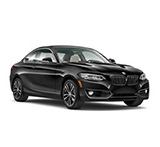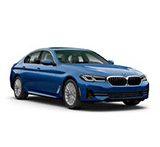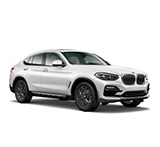BMW

About BMW
Bavarian Motor Works, better known as BMW, is an automotive company with a rich and intriguing history. The company, which has risen to prominence for producing German-made luxury automobiles, was founded almost a century ago, and has endured despite numerous setbacks, including Germany's struggles following the Second World War.
In more recent decades, BMW has grown into a globally-recognized automotive leader, expanding its presence beyond European borders. Today, BMW is one of the most internationally recognized acronyms in the world. The company has expanded its business, establishing factories in such countries as South Africa, India, China, and the United States.
Check out the timeline below to learn more about the history of this fascinating company.
The Automotive History of BMW, 1913-Present
1913-1916 - Bavarian Motor Works is first established as a result of a merger between engine manufacturing companies run by Karl Rapp, Franz-Josef Popp, and Gustav Otto. The company is initially known as Bayerische Flugzeug-Werke (BFW), as Otto's company began as a manufacturer of airplane engines.
1917 - BMW's success begins with their initial product, the IIIa airplane engine. This engine contains an innovative carburetor, which greatly improves plane performance at high altitudes. Popp encourages the German government to purchase the IIIa engines, and ultimately succeeds, boosting the company's business during WWI.
The company's iconic blue-and-white logo is also introduced in 1917. The colors, the same as those found in the Bavarian flag, are divided into four segments in a circular frame, representing a twirling airplane propeller. Though the company has evolved into an automotive brand over time, its logo has remained practically the same ever since.
1928 - BMW first begins constructing automobiles. The company's first car, the Dixi, is small and open-roofed, with top speeds of around 50 miles per hour. Less than 19,000 Dixis were produced.
1940 - The BMW 328, a new, aerodynamic and light-weight aluminum racecar, wins the renowned Mille Miglia race in Italy. Baron Fritz Huschke von Kanstein took home the trophy as a result of the vehicle's incredible average speed of 103 mph.
1951 - After the devastation of World War II, BMW needed years to recoup their losses. Many of their plants had been destroyed and dismantled due to their cooperation with the Third Reich.
By 1951, the company has finally recovered enough to release the BMW 501. Though this luxury car did not succeed in war-devastated Germany, it was indeed a step in the right direction.
1972-73 - BMW begins to expand its business around the globe. The company begins manufacturing cars in South Africa in 1972, becoming the first BMW manufacturing facility outside of Germany. By 1973, the company is beginning to expand its sales subsidiaries as well, beginning with its sales group in France. These expansions are the first steps towards BMW "going global."
1979 - Bavarian Motor Works establishes itself as a leader in the development of new electronic car technologies. The company develops digital motor electronics, known as DMEs. These microcomputers resulted in improved gas mileage, reduced emissions, and increasingly excellent engine performance. Time and money is invested in researching the possibilities of using hydrogen and electricity as automotive power sources, too, placing the company well ahead of the curve.
1986 - The BMW M3 is released. This speedy, compact car will ultimately become one of the most successful touring sports cars in history, winning the World Touring Car Championship in 1987, amongst other titles. The company also celebrates their most successful business year in the United States. With nearly 100,000 vehicles sold in the U.S. alone, BMW feels confident that their global expansion is a success.
1992 - BMW makes plans to establish their first factory in the United States. This new plant will be 1,150 acres large, and will be established in South Carolina.
1994 - The BMW U.S. Manufacturing Company opens its doors. This plant has produced such cars as the E36 3 Series, Z3, and Z4.
1998 - BMW acquires the famous British automotive luxury brand Rolls-Royce. The company has since produced new Rolls-Royce vehicles, with the subsidiary experiencing its highest sales ever in 2013.
2001 - BMW releases the new MINI and MINI Cooper vehicles. These young, hip cars have been a smash success worldwide; as of 2014, the MINI line includes six different car models. The vehicle has experienced the warmest reception in the United States, where over 60,000 MINI vehicles are purchased every year.
2005-08 - BMW wins the International Engine of the Year award four years in a row, amongst other national and international accolades.
2013 - The newly-released BMW i3 car garners attention worldwide for being the first all-electric vehicle produced by BMW. 100% emission-free, the vehicle has been recognized as the 2014 World Green Car of the Year and as the 2014 Car Design of the Year. The vehicle is environmentally friendly, practical, and stylish, and is making a splash in both Europe and the United States.
2014 - As of 2014, the BMW U.S. Manufacturing plant in Greer, South Carolina is the sole producer of X3, X4, X5, and X6 BMW vehicles in the world. This U.S. plant produces the world's supply of these cars. The plant has been a costly but profitable investment, costing over $2 billion to establish. The U.S. factory, home to over 10,000 employees, is the largest automotive factory in the world based on its number of workers.
Though many individuals do not realize it, the United States is BMW's largest market. Due to the brand's overwhelming popularity in North America, it is likely that the company will continue to expand its manufacturing and sales sectors within the U.S.
Though Bavarian Motor Works may always be a German brand at heart, the company's expansion in recent years has made the corporation an international powerhouse. If the past is any indicator of BMW's future, this company will be enjoying worldwide success for decades more to come.





















